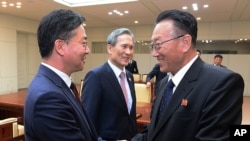South Korea may have discovered new leverage against North Korea from the recent military standoff over land mine blasts that injured two South Korean soldiers, according to South Korean officials and experts.
The two sides reached an agreement early Tuesday to end the standoff, after marathon talks that stretched over more than 40 hours.
The inter-Korean deal is viewed as a big win for South Korean President Park Geun-hye, who took a tough stance on North Korean aggressions.
Key parts of the agreement, including the resumption of government-to-government talks and reunions of separated families, address issues favored by South Korea. The lifting of the so-called May 24 measure, a retaliatory action taken by Seoul against Pyongyang after the fatal sinking of a South Korean navy ship in 2010, was not included in the agreement. Pyongyang has been demanding that Seoul lift the sanctions since early 2013, when Park took office.
South Korean officials familiar with the talks said propaganda broadcasts over loudspeakers played a key role in winning concessions from North Korea in the talks. South Korea’s consent to stop the broadcasts was North Korea’s key condition for the agreement.
Analysts in Seoul say South Korea may have not fully understood the value of the broadcasts as leverage in inter-Korean relations until the recent confrontation. Some military experts have doubted the South Korean Defense Ministry’s decision to choose the propaganda broadcasts over military action in its response to the blasts.
To North Korea, the propaganda campaign is more than a bargaining chip in inter-Korean politics, according to Victor Cha, senior adviser and Korea chair at the Center for Strategic and International Studies in Washington.
“If they really didn’t care about the broadcast and they were just using it as a pretext for ramping up tensions, then this could have gone on for much longer,” said Cha in reference to the inter-Korean talks in Panmunjom.
The propaganda broadcasts run by the South Korean military are a key part of the South Korean psychological warfare against the communist neighbor. The South Korean military runs about a dozen facilities scattered near the countries' shared border, with each facility equipped with a bank of 48 loudspeakers. The broadcasts are aimed at North Korean soldiers deployed on the border. According to South Korea’s Defense Ministry, the broadcasts can reach the intended target more than 20 kilometers away during the night.
Kim Min-seok, spokesman for South Korea’s Defense Ministry, told reporters that the military is focusing its effort on providing information and facts about the outside world, including the superiority of a free and democratic society, and South Korea’s economic and democratic development, while trying to avoid random criticism of the North Korean leadership.
Kim said capturing the daily lives of an average South Korean young adult is one of the common themes of the broadcasts. Examples from Korean entertainment and popular culture, including the K-pop musical genre, are also being broadcast to North Korea, the spokesman said.
Ahn Chan-il, a former North Korean soldier who defected to South Korea in 1979, said the broadcast is a stimulant to the lives of North Korean soldiers.
“In North Korea, listening to South Korean broadcasts is considered an act of treason subject to punishment. The soldiers deployed on the front lines can listen to the broadcast, tasting a sense of freedom without fear of being caught,” said Ahn.
The loudspeaker broadcasts have long been a point of tension between the two sides. In 2004, South Korea stopped the broadcasts to implement an agreement reached during the landmark 2000 inter-Korean summit. Recently, South Korea resumed the broadcasts for the first time in 11 years in response to the land mine incident.
Jee Abbey Lee contributed to this report.
